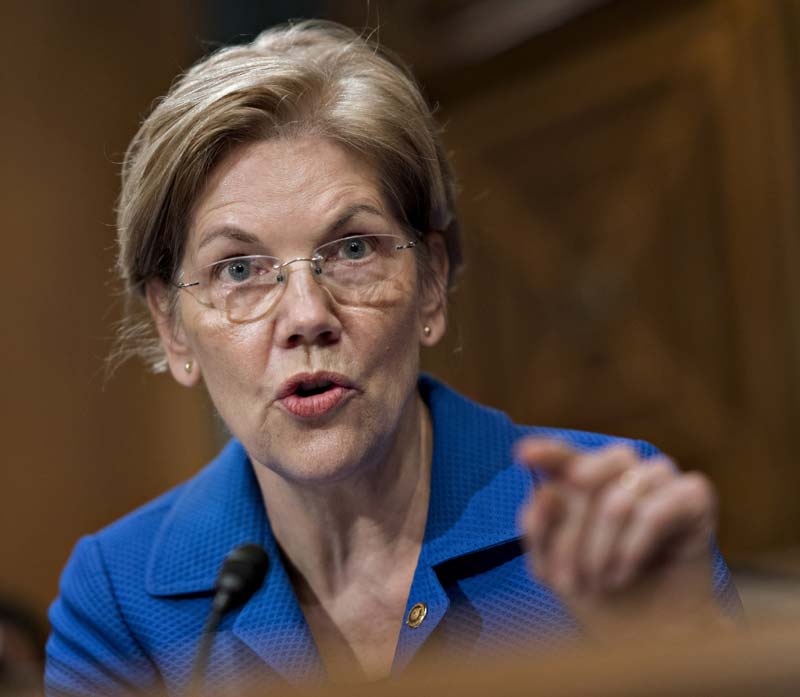 Andrew Harrer for Bloomberg
Andrew Harrer for Bloomberg
The Washington Post reports:
"Sen. Elizabeth Warren, D-Mass., announced Monday that she will not participate in a high-dollar fundraising program during her bid for the Democratic presidential nomination, staking out a position that differentiates her from most other contenders in the field.
" 'Candidates spend too much time with wealthy donors, and I've made a decision to change that,' Warren wrote as the subject line in an email that went out to her supporters Monday morning explaining the decision.
" 'That means no fancy receptions or big money fundraisers only with people who can write the big checks,' Warren wrote. 'It means that wealthy donors won't be able to purchase better seats or one-on-one time with me at our events.' "
If you are inclined to be cynical, you might surmise she is doing poorly with fundraising. Abandoning modest fundraising activities makes her shortcoming into a virtue, an attempt to level the playing field.
There are several points worth underscoring.
First, we are not talking about really big donors. The people Warren declines to cater to (literally, if one includes the canapés served at soirees) are not millionaire-donors. She has already written off that sort of money by swearing off PAC money. These are the people who are limited to $2,800 per individual. That's nothing to sneeze at, but by the same token are we to believe a candidate can be bought or even influenced by $2,800? The problem, we thought, with the Citizens United ruling was PAC money from unknown sources; now we're to believe the problem extends to a professional able to donate $2,800.
Second, since $2,800 donors don't seem worthy of suspicion, most if not all of the other candidates could well decide they'll be very happy, thank you, to continue catering to such donors. They very well may decide that donor events for hard money, limited and fully disclosed, are unobjectionable. Why should they turn up their noses at the additional dollars, not to mention the enthusiasm and commitment to their campaigns, that donor events can generate? If others decline to copy her, Warren will wind up poorer and only reinforce the impression, created in part by the DNA fiasco, that she's not the candidate with the best political skills to go up against the real target, President Donald Trump.
Third, Sen. Bernie Sanders (and maybe others) are raking it in thanks to small donations. That's the real issue: Why aren't these small donors coming to her instead of Sanders, Sen. Kamala Harris, D-Calif., etc.? If one looks at the early polling (which is not predictive, but reflective of this moment in time) and the money, one has to wonder if Warren hasn't yet found how to connect with voters, regardless of the level of giving. Rather than rely on a stunt, perhaps she needs to think more deeply whether she is really connecting with critical early state voters.
Fourth, we have in the past made the case that money is overrated. If I'm right and less money (or less wealthy donors) doesn't give candidates any advantage, it sort of defeats the crusade against Citizens United and PACs more generally. Why not let rich people and corporations waste their money? You only "buy" candidates if your money is critical to their success. If it becomes apparent that their money is superfluous, the impression of great influence will fade.
Finally, if you are concerned about polarization and extremism in politics, don't think that you'll improve matters by calling out larger donors. Sure, there are highly partisan donors (e.g. Tom Steyer on the left, Charles Koch on the right), but at least in this election cycle, the pressure (if any) from $2,800 donors and even from million-dollar PAC donors is in favor of electability. It's the $50-per-month super-engaged activists who may be pushing candidates to the left. It's the constant effort to keep those voters/donors enraged and hyperventilating that may be the greatest threat to reasoned, moderate debate.
Reliance on super-motivated small donors, one Democratic campaign veteran tells me, "is sort of like the donor caucuses. Yes, you get something valuable (money/delegates). But the process rewards moving left in dangerous ways." The veteran adds, "That's actually a huge and underreported dynamic of this campaign: The consultants are pushing them to take far lefty positions to generate clicks and online dollars."
In short, it's unclear whether Warren's gambit will work - and if it does, if it perversely winds up proving that campaign finance reform is overrated. Rather, her new strategy might indicate a more fundamental problem with her campaign. In any event, don't imagine that the $2,800 donors are a problem of our political system; the radicalization and polarization of ordinary voters remain the biggest impediments to sensible, rational politics. Unfortunately, there's no easy remedy for that. (Maybe we should revive civic education and media literacy, or break the social media algorithms that promote confirmation bias.)
Nixing cocktail parties and rubber-chicken dinners for upper-middle-class donors might ironically make things worse.
Sign up for the daily JWR update. It's free. Just click here.
(COMMENT, BELOW)


 Contact The Editor
Contact The Editor
 Articles By This Author
Articles By This Author